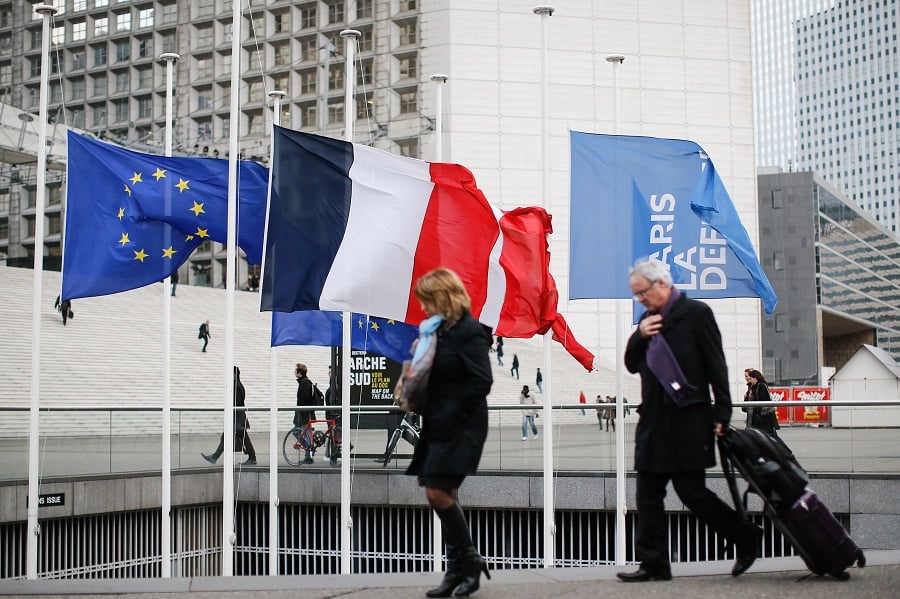Much to the surprise of some market watchers, investors — and thus, financial markets — Monday looked past the brutal terror attacks in Paris on Friday that left 129 people dead and hundreds injured.
Having the weekend to absorb and clarify the full magnitude of the tragedy, the U.S. equity markets have been hovering in positive territory from the open.
“Over the weekend, I thought we would be looking at a 1% to 2% decline to open trading, and the futures were down roughly 1% last night, but then steadily marched higher,” said Paul Schatz, president of Heritage Capital.
“With the stocks up slightly this morning, it's a modestly bullish sign of a resilient market,” he added. “Markets continue to price in future terrorist attacks at an increasing rate since 9/11, and that's not to say the markets are complacent, but they're adjusting and adapting to the new reality of being at constant war against an unconventional enemy.”
The subdued market reaction to
what happened in Paris, and the immediate geopolitical response, reflects a perspective that separates terror and tragedy from market fundamentals, according to Brad McMillan, chief investment officer of Commonwealth Financial Network.
“I don't want to in any way minimize the human tragedy, but this doesn't give us any new news, because we already knew there are maniacs who want to kill innocent people,” he said. “I don't think this represents a systematic risk, and I wasn't expecting much of a reaction from the financial markets.”
ALL MANNER OF SHOCKS
Since World War II, the U.S. equity markets have been tested by all manner of shocks to the system, with most downturns seeing relatively speedy recoveries.
The April 2013 bombings at the Boston Marathon, for example, saw the S&P 500 Index drop 2.3% on the first day and lose a total of 3% over a four-day decline. But the recovery back to pre-bombing levels took just 15 days.
The
May 2013 “taper tantrum,” when the Federal Reserve first hinted at reducing its multitrillion-dollar quantitative easing program, led to a 0.8% drop in the S&P on the first day and a total decline of 5.8% over the next 34 days. It took the market 51 days to fully recover.
In September 2008, the S&P dropped 4.7% on the day Lehman Brother filed for bankruptcy protection, and fell a total of 46% over the next 176 days of the financial crisis. It took 828 days to recover.
And the September 2001 terror attacks saw the S&P lose 4.9% immediately, and experience a total drop of 11.6% over 11 days. It took 31 calendar days for the market to fully recover to pre-attack levels.
“Market responses after bombings and shootings, which are more abhorrent than acts of nature, cause the market to fall even less on average, as well as bottom sooner and recover faster,” said Sam Stovall, U.S. equity analyst at S&P Capital IQ.
INDIGESTION
“The market thus far in November has been undergoing an uncomfortable digestion of unhealthy rapid overindulgence experienced in October, and it now has to contend with the uncertainty surrounding the aftermath of the Paris terror attacks,” Mr. Stovall said. “History says, but does not guarantee, that market weakness following such horrible events is typically short-lived and advises investors not to add remorse over selling equities into this weakness to the grief we are now experiencing over the loss of innocent life.”
Mr. McMillan of Commonwealth suggested that, in addition to the fundamental and economic disconnect between a terrorist attack and a financial shock, investors are unfortunately becoming accustomed to the reality of terror.
“Here in the U.S. you're reminded that 9/11 happened every time you check into an office building, or get on a plane, or look at the New York skyline,” he said.
It would be a mistake for the Fed to use the Paris terror attacks as
an excuse to not raise interest rates, Mr. McMillan said.
“If there's even a hint that the Fed won't raise rates because of this, it raises the fears that they will never raise rates,” he said.
That same sentiment was echoed over the weekend by DoubleLine Capital co-founder Jeffrey Gundlach, who said the
Paris attack alone is unlikely to play a role in the Fed's decision.







